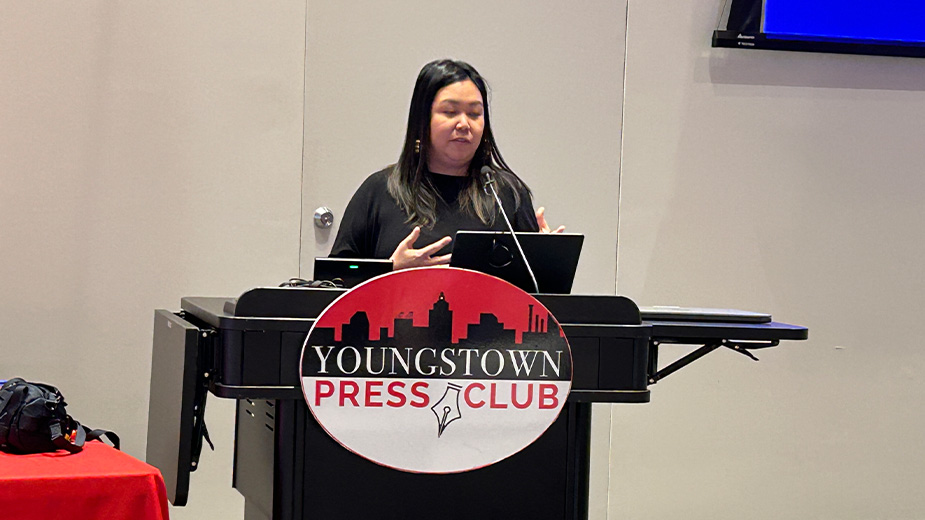Internet of Things Poised to Impact Manufacturing
CANFIELD, Ohio – With internet-connected devices becoming more and more common, the time is soon approaching that companies will be able to take advantage of the Internet of Things in a way that has a major impact on their business.
The Internet of Things is “essentially just devices that have actuators or sensors or something that can act upon the real world with internet connectivity,” said Michael Walker, an adjunct faculty in Youngstown State University’s computer science and information systems department. “It can communicate locally with a bunch of other sensors on other devices or it can connect to something like a home assistant where everything’s kept in the cloud.”
Walker was among the speakers Friday at the Mahoning Valley Manufacturers Coalition quarterly meeting.
“Manufacturing is where the real opportunities exist for better automation, better process control,” he said. “You can use sensors to detect when things are misaligned or not working properly and [allow users] to do preventive maintenance or produce more reliable output with lower downtime and safer environment.”
By 2025, the Internet of Things, or IoT, is forecast to have an economic impact in the nation’s manufacturing sector of between $1.2 trillion and $3.7 trillion. While that sector is where most of the impact will be seen, IoT devices will also boost the retail ($0.4 trillion to $1.2 trillion), worksite ($0.2 trillion to $0.9 trillion) and office ($0.1 trillion to $0.2 trillion) sectors. By 2020, there will be an estimated 30 billion IoT devices.
“The core fundamental technology has existed for years with different names, but right now the grand vision can be bought off the shelf,” Walker said. “They can either create their own IoT devices that they use in-house or they outsource from someone who manufactures them.”
The advantage of IoT devices isn’t widespread yet, noted MVMC Executive Director Jessica Borza, but could change the way the Valley’s manufacturers work.
“We see some early adoption now, but it’ll be a game-changer for the industry and something we all ought to keep an eye on,” she said. “The timing is a little unknown as to when exactly it’ll hit, but we want to introduce these topics to our manufacturers so they’re prepared.”
While not a manufacturer, Youngstown-based Ving has made a foray into IoT devices, said CEO Tony DeAscentis. The software company has installed Philips Hue lights, he said.
“It tells us how much energy we’re consuming and if we’re consuming too much, what we can do to consume less of it. The light bulbs start to learn when we’re really not using energy to optimize consumption,” he said.
He added that on a recent trip to a Bosch power tools lab, the company discussed using connectivity to remotely monitor the status of tools on worksites.
“They’re sending a ton of data back to the corporate office and they can predict when a drill is going to break. Prior to it breaking, someone can show up at the site with a new drill, so the person has no downtime,” he said. “Think about all the things on a worksite that can be connected, that’s really powerful in the manufacturing world.”
To help area businesses better understand how IoT can be incorporated into their companies, YSU will be hosting a series of seminars early next year in conjunction with Youngstown Business Incubator and Cisco. The first, an informational session, will be held Jan. 9 at the YBI, followed by two hands-on sessions Jan. 16 and 23.
“Understanding something just at the surface level and making decisions based on that can be more disadvantageous than not knowing anything,” Walker said. “We want to assist all our partners in understanding the deeper ramifications and the benefit costs of IoT networking and how it works for and against you.”
The first seminar will cover hardware, networking, what it takes to make IoT work and security, which should be among businesses’ top concerns when deciding to adopt the technology, Walker said.
“You don’t want to be putting IoT devices in your manufacturing plant or your workshop that are recording all your audio or video that you can’t control,” he said. “You don’t want devices on your system that control manufacturing if they can be hacked into. That’s my No. 1 concern with IoT devices.”
Copyright 2024 The Business Journal, Youngstown, Ohio.



